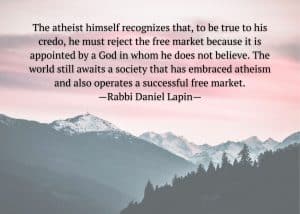Rabbi Daniel Lapin observes,
All human activities can be located somewhere on the spectrum that is anchored at one end by spirituality and at the other by physicality. Praying is near the spiritual end; reading and writing, composing music and making tools might be its neighbors. As the source of great sensual pleasure and of new life, sex might be somewhere near midspectrum, while eating and all other bodily functions belong over toward the physical end. Where do commercial transactions fit on the spectrum? When a man exchanges coins in his pocket for goods he desires, is he performing a physical act or a spiritual one?
One way of identifying a spiritual act is by determining whether a chimpanzee would understand the action. This is because God endowed man with His spirit and so distinguished between man and chimpanzee. When I return home from work and slump into a comfortable armchair, my pet primate undoubtedly sympathizes. As I move to the dinner table and begin eating, he certainly knows what is going on. When I open a newspaper, however, and hold it motionless before my face for twenty minutes, he becomes quite confused. He cannot relate to the pleasure I gain from that piece of paper.
Another criterion for a spiritual act is whether the action can be replicated my a machine. If a human soul is indispensable for a certain process, that process is at least partially spiritual. Music can inspire the soul in man so that he marches off to war or finds a lump in his throat. No machine will choke up when hearing Mozart’s Eine Kleine Nachmusik. No machine exhibits loyalty or can even test whether an individual possesses that quality. Loyalty is a spiritual characteristic.
What of a business transaction? Does it belong on the spiritual or physical side of the spectrum? A chimpanzee would not have the slightest idea what is transpiring between proprietor and customer at the corner of a store. He can relate very well to grabbing a banana from someone; he can even understand proffering that banana to his offspring. He may imitate someone exchanging metal disks for bananas, but he cannot intellectually initiate and carry through a business deal. Neither do machines exist that can independently effect a transaction. They cannot predict whether a customer will buy something or for how much. Economic exchange takes place only after two thinking human beings will it. The process is spiritual.
Thus, atheism and business are not natural allies. One would have supposed that a philosophy of secular humanism, recognizing no authority, would be naturally drawn to the world of money and power. One would have expected the political Left to excuse what it calls the “greed” of capitalism and to recognize it as nothing other than Darwinian law applied to the life of modern man. Yet, this is not possible; something as spiritual as commerce simply cannot coexist with socialism. The atheist himself recognizes that, to be true to his credo, he must reject the free market because it is appointed by a God in whom he does not believe. The world still awaits a society that has embraced atheism and also operates a successful free market. That this has not happened is no coincidence, but rather a consequence of the spiritual nature of money.

Rabbi Daniel Lapin, America’s Real War: An Orthodox Rabbi Insists that Judeo-Christian Values Are Vital for Our Nation’s Survival, (Sisters, OR: Multnomah Publishers, 1999), 216-217.
Visit Rabbi Lapin’s website at https://rabbidaniellapin.com.
